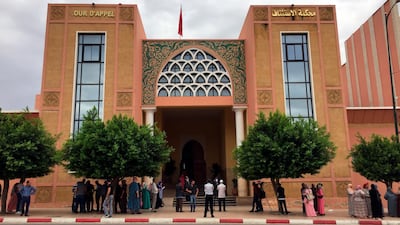Morocco has enacted a new law criminalising abuse against women but critics have labelled it a box ticking exercise that will not be effective in addressing sexual harassment and gender-based violence.
The bill, which was approved by Moroccan parliament in February and came into force last week, criminalises sexual harassment, forced marriage and some forms of domestic violence. It also levies heavier penalties for crimes committed within the family, though it fails to criminalise marital rape.
A person found guilty of sexual harassment through the unsolicited use of words, acts or signals of a sexual nature – carried out in person, via telephone or online – may be sentenced to between one and six months in prison, and fined between $200 and $1,000.
The law – which is known locally at the Hakkaoui law after Bassima Hakkoui, Minister for Family Affairs and Women’s Issues – defines violence against women as “any act based on gender discrimination that entails physical, psychological, sexual, or economic harm to a woman.” It obligates authorities to raise awareness about gender-based violence and instructs the establishment of national committees to serve the needs of women and children.
In 2009, a Moroccan governmental survey found that 62.8 per cent of women had experienced physical, psychological, sexual or economic violence. Of the 55 per cent who reported experiencing conjugal violence, only three per cent reported it to the authorities.
_________
Read more:
Support for Moroccan teen intensifies as alleged captors deny wrongdoing
Moroccan star Saad Lamjarred arrested in France over alleged rape
After a third rape charge, have Lamjarred’s fans finally woken up to a darker truth?
_________
Under the rule of King Mohammed VI, a number of laws have been passed that have been hailed as progressive for women’s rights, including the Moroccan Family Code – or Mudawana - which passed in 2004 and regulates issues concerning marriage, divorce, inheritance, polygamy and custody.
But rights advocates criticised the Hakkaoui law for failing to detail the monitoring mechanisms needed to ensure that authorities are held accountable for their new duties.
Rothna Begum, Middle East and North Africa women’s rights researcher at Human Rights Watch said: “Morocco’s law on violence against women finally recognises some forms of abuse that many women face from their husbands and families.” But she stressed that the Moroccan authorities should “address gaps to ensure that all survivors are protected from abuse, and police and prosecutors do their jobs.”
The bill is more of a box-checking exercise than an effective law, said Stephanie Willman Bordat, a human rights advocate at the Morocco-based Mobilising for Rights Associates.
To effectively criminalise violence against women, the law needs to be more comprehensive, she said. “It’s got so many loopholes, so many vague provisions, so many weaknesses that it’s just not going to provide anything resembling an effective response to violence against women.”
The bill increases the penalty for crimes committed within the family, such as assault and battery and domestic violence, but has been criticised for failing to establish protective measures or to provide guidelines to police and prosecutors on how to carry out investigations.
According to Human Rights Watch: “Most women drop the few criminal cases that are filed as a result of pressure from their or their abuser’s families or because they are financially dependent on their abusers.” The new law doesn’t provide legal, medical or housing assistance to victims of violence.
Ms Bordat is concerned that the lack of concrete guidelines for reporting, proving and prosecuting violence leaves the new legislation open to interpretation or mishandling.
“Sexual harassment is a crime,” she said, “but the law doesn’t say anything about what’s evidence of the crime; how are you supposed to prove that you were sexually harassed?”
Advocacy groups also point to the fact that the criminal code still criminalises sexual relations outside of marriage, meaning that rape victims who are unable to prove their assault run the risk of being charged as a criminal for extramarital sex.
Womens’ rights organisations have been calling for a law criminalising gender-based violence for twelve years, so Ms Bordat considers it unlikely that parliamentarians may soon amend the law to sufficiently protect women.
She points to the failure of the legislation to instruct its own implementation as a grave shortcoming, and one that will compromise the protection of women.
“If women aren’t ever going to be able to report the crime and if police are never going to be able to investigate it, and if prosecutors are never going to be able to prosecute it then you’re never going to get to the point of sentencing people to jail.”

